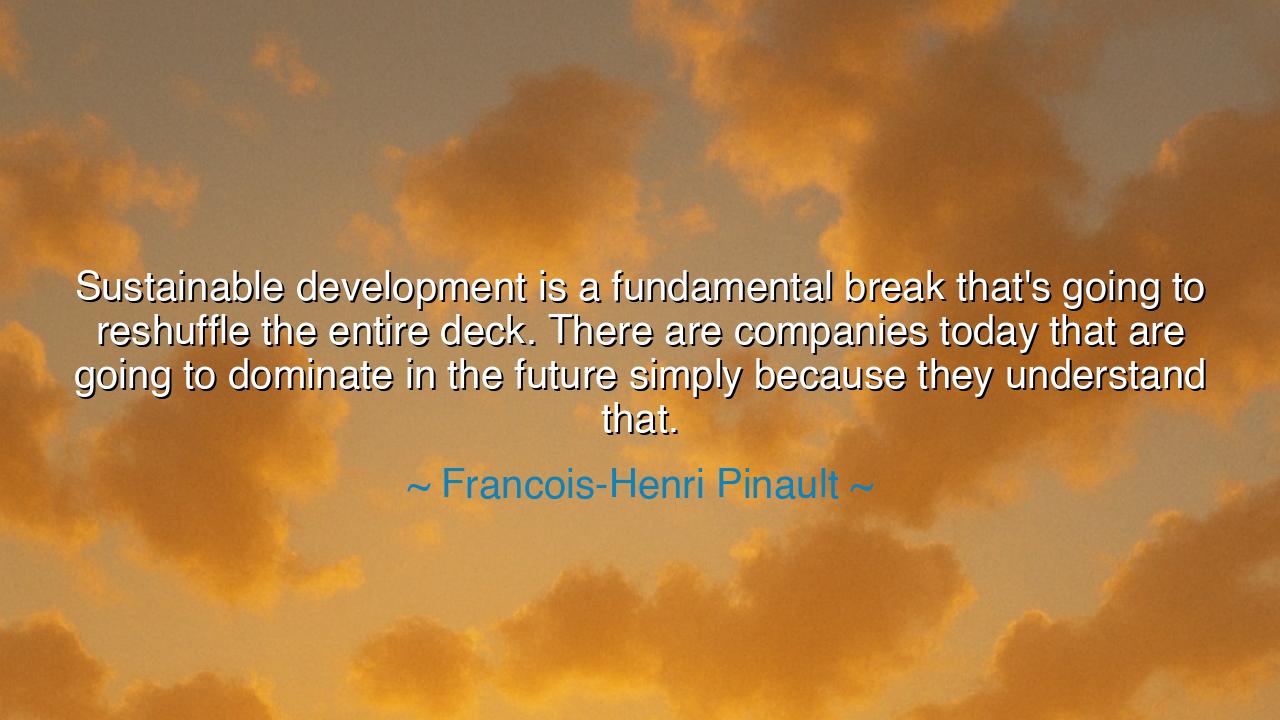
Sustainable development is a fundamental break that's going to
Sustainable development is a fundamental break that's going to reshuffle the entire deck. There are companies today that are going to dominate in the future simply because they understand that.






The words of François-Henri Pinault—“Sustainable development is a fundamental break that's going to reshuffle the entire deck. There are companies today that are going to dominate in the future simply because they understand that.”—are not the language of mere commerce; they are the prophecy of transformation. Spoken by a leader who sees beyond profit into purpose, these words call forth a new age—an age where the wealth of the earth and the wisdom of man must finally walk hand in hand. He speaks of sustainability, not as a fashion of the moment, but as a revolution of the spirit—a breaking away from the greed that has scarred the earth, toward a new covenant between humanity and creation.
In ancient times, every civilization had its moment of reckoning—a moment when the old ways, once mighty, could no longer sustain the weight of their own excess. The Babylonians built towers of splendor, yet their soil turned to dust. The Romans conquered the known world, yet their empire crumbled under its own indulgence. Now, in this modern age, the same warning rises anew, but on a global scale. The temples of our time are built not of stone, but of steel and smoke; the legions we command are machines that burn the lifeblood of the planet. Pinault, with the eyes of foresight, declares that sustainable development is not merely an economic shift—it is a moral awakening, a breaking of the wheel that has long spun toward destruction.
He speaks as one who understands that the laws of nature are not negotiable. To exploit without replenishment is to write one’s own doom. The earth gives generously but demands respect in return. In this truth, Pinault’s words carry the weight of ancient wisdom—the same that the old philosophers of the East and the druids of the West once taught: harmony is power, not weakness. When he says that some companies will dominate the future because they understand this, he means that survival will belong not to the ruthless, but to the wise—to those who innovate with conscience, who see prosperity not in endless consumption, but in balance and renewal.
Consider the example of Patagonia, a company that chose a different path from its peers. While others sought to sell more, Patagonia sought to waste less, urging its customers to buy only what they need. Many mocked this approach, calling it naïve. Yet in time, the world turned, and the company’s integrity became its crown. It drew loyalty not through manipulation, but through meaning. Such enterprises stand as the new heroes of our age—those who see profit as the servant of purpose, not its master. They embody the wisdom that to sustain is to lead, and to protect is to prosper.
The “reshuffling of the deck” that Pinault foretells is not merely industrial—it is spiritual. It demands that every creator, builder, and dreamer redefine success. No longer can progress be measured only by wealth, but by the well-being of the world. In this vision, the future belongs to those who dare to align ambition with compassion. Just as in the Renaissance, when art and science united to illuminate the darkness, so too now must industry and conscience unite to heal the earth. Those who fail to understand this will fade, like empires that ignored the signs of their decline.
And yet, this change is not easy. It is a break, as Pinault calls it—a rupture from comfort, a turning away from the temptations of speed and greed. The merchants of the old world will resist; the careless will scoff. But the brave will endure, for they know that every great renewal begins with upheaval. The forest must burn for new growth to rise. So too must the engines of endless exploitation fall silent for the harmony of sustainable creation to begin.
From his words, we draw a lesson of deep power: true leadership is stewardship. To lead is not to consume the world faster than others—it is to preserve it better. Each of us, whether merchant or maker, consumer or creator, holds a fragment of that responsibility. Choose to live with foresight. Let your work, your art, your labor be a tribute to endurance, not excess. Think of the generations that will walk the same earth and breathe the same air, and act so that they may thank you, not curse you.
Thus, let this teaching stand as a beacon for the coming age: sustainability is not restraint—it is renewal. The future will not belong to those who take the most, but to those who give back what they have taken. The age of blind consumption ends; the age of mindful creation begins. And those who understand this truth, as François-Henri Pinault foretold, shall not merely survive the change—they shall lead it, becoming architects of a new and enduring world.






AAdministratorAdministrator
Welcome, honored guests. Please leave a comment, we will respond soon